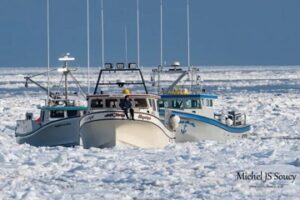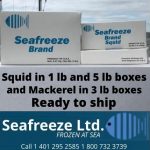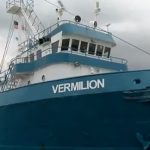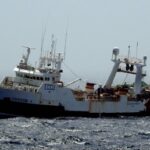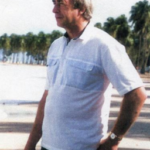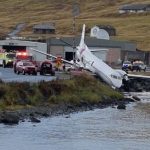Tag Archives: Department of Fisheries and Oceans
Digby and Annapolis halibut fishermen and fish plant rack up big penalties

North Coast Fishermen cry foul on salmon allocation
 Joy Thorkelson is wondering who will stand up for the commercial fishing industry in light of another dismal season on the North Coast. “The Skeena fishing story is, unfortunately, a sad one again this year. This season the Department of Fisheries predicted the Skeena run size to be 2.64 million sockeye. They allowed the commercial fleet to catch 474,081 sockeye or 18 per cent of the run,” Read the rest here 13:05
Joy Thorkelson is wondering who will stand up for the commercial fishing industry in light of another dismal season on the North Coast. “The Skeena fishing story is, unfortunately, a sad one again this year. This season the Department of Fisheries predicted the Skeena run size to be 2.64 million sockeye. They allowed the commercial fleet to catch 474,081 sockeye or 18 per cent of the run,” Read the rest here 13:05
Eel fishermen meet with DFO to prevent gear conflicts
 The eel fishing season has started on Prince Edward Island and representatives from the federal Department of Fisheries and Oceans have met with fishermen to help prevent any trouble. Higher eel prices and a decline in other fishing industries have encouraged people to harvest eels. Read more here 11:39
The eel fishing season has started on Prince Edward Island and representatives from the federal Department of Fisheries and Oceans have met with fishermen to help prevent any trouble. Higher eel prices and a decline in other fishing industries have encouraged people to harvest eels. Read more here 11:39
Bands to start salmon testing
![]() First Nations’ health officials are preparing to test salmon near the site of a massive mine tailing spill in B.C. amid fears in aboriginal communities that fish from affected lakes and rivers aren’t safe to eat. <Read more here> 18:47
First Nations’ health officials are preparing to test salmon near the site of a massive mine tailing spill in B.C. amid fears in aboriginal communities that fish from affected lakes and rivers aren’t safe to eat. <Read more here> 18:47
P.E.I. Fishermen’s Association: Lobster season opening could be safer
 The federal Department of Fisheries and Oceans makes the final decision when to go ahead, with input from fishing groups. In this case, the decision to go ahead was made 24 hours in advance. <Read more here> 11:26
The federal Department of Fisheries and Oceans makes the final decision when to go ahead, with input from fishing groups. In this case, the decision to go ahead was made 24 hours in advance. <Read more here> 11:26
DFO Officers seize 1,700 kg of rotten fish near Hay River, N.W.T.
![]() Fisheries officers then took out a boat and found two kilometres of abandoned net that had about 1,770 kilograms — roughly 3,900 pounds — of fish that were rotten and <Read more here> 15:44
Fisheries officers then took out a boat and found two kilometres of abandoned net that had about 1,770 kilograms — roughly 3,900 pounds — of fish that were rotten and <Read more here> 15:44
Scientists study capelin reproduction cycles in Trinity Bay
 Researchers are keeping a close eye on how capelin are spawning and developing off the waters of Newfoundland. Scientists have flocked to Bellevue Beach in Trinity Bay — one of the most important capelin spawning areas in the province — to find out why the fish are thriving in these waters. Read more here 10:14
Researchers are keeping a close eye on how capelin are spawning and developing off the waters of Newfoundland. Scientists have flocked to Bellevue Beach in Trinity Bay — one of the most important capelin spawning areas in the province — to find out why the fish are thriving in these waters. Read more here 10:14
Federal Fisheries Minister Gail Shea refuses to budge on inshore shrimp cuts
 Federal Fisheries Minister Gail Shea stood her ground Tuesday on controversial quota reductions that will cut most deeply among inshore fishermen, and admonished Newfoundland and Labrador for an unfulfilled promise to rationalize the processing sector. “We believe we are looking at plant closures. We are looking at harvesters who are getting maybe bankruptcies,” (Keith) Hutchings told reporters. Read more here 08:56
Federal Fisheries Minister Gail Shea stood her ground Tuesday on controversial quota reductions that will cut most deeply among inshore fishermen, and admonished Newfoundland and Labrador for an unfulfilled promise to rationalize the processing sector. “We believe we are looking at plant closures. We are looking at harvesters who are getting maybe bankruptcies,” (Keith) Hutchings told reporters. Read more here 08:56
Salmon can adapt to warmer environment, study says
![]() With climate change heating up British Columbia’s rivers, there are growing concerns about the vulnerability of cold-water species such as salmon. But a shows salmon may have the ability to adapt to a warming world because Chinook that lay larger eggs produce offspring that have greater heat tolerance. Read more here 10:39
With climate change heating up British Columbia’s rivers, there are growing concerns about the vulnerability of cold-water species such as salmon. But a shows salmon may have the ability to adapt to a warming world because Chinook that lay larger eggs produce offspring that have greater heat tolerance. Read more here 10:39
FFAW PRESS RELEASE – 3Ps Fish Harvesters Affected by Unfair Quota Allocations
ST. John’s, NL – For the second year in a row, groundfish harvesters on the south coast of Newfoundland have been effectively put out of business in midseason because of unfair quota allocations by the Department of Fisheries and Oceans. Read more here 10:16
Spiny dogfish shark boom bane for N.S. fishermen
 According to the report, in 2013 there were nearly six times more tonnes of spiny dogfish caught in the 2013 survey off Nova Scotia, compared to the 2012 survey. A total 259,461 tonnes of spiny dogfish were recorded off the coast in 2013, compared to 44,310 in 2012 and just 3,353 in 2011. Read more here 07:26
According to the report, in 2013 there were nearly six times more tonnes of spiny dogfish caught in the 2013 survey off Nova Scotia, compared to the 2012 survey. A total 259,461 tonnes of spiny dogfish were recorded off the coast in 2013, compared to 44,310 in 2012 and just 3,353 in 2011. Read more here 07:26
Traceability to help Newfoundland tell its unique story to the world
 The world will now be able to find out if their seafood came from such colourfully named places as Black Duck Brook, Cow Head, Spirity Cove, Shag Island and a place simply known as The Bank. These are only a few of the 80 Newfoundland fishing ports where traceable Atlantic halibut and lobster will come ashore this spring and summer. Read more here This Fish website here 14:47
The world will now be able to find out if their seafood came from such colourfully named places as Black Duck Brook, Cow Head, Spirity Cove, Shag Island and a place simply known as The Bank. These are only a few of the 80 Newfoundland fishing ports where traceable Atlantic halibut and lobster will come ashore this spring and summer. Read more here This Fish website here 14:47
BC Becoming a ‘Poacher’s Paradise’
![]() Budget cuts and enforcement downsizing have left British Columbia open to fish poachers with little risk of getting caught while they launder their unlawful catch in the commercial market, according to the former director of the Department of Fisheries and Oceans Canada’s conservation and protection branch in the Pacific region. Read more here 09:54
Budget cuts and enforcement downsizing have left British Columbia open to fish poachers with little risk of getting caught while they launder their unlawful catch in the commercial market, according to the former director of the Department of Fisheries and Oceans Canada’s conservation and protection branch in the Pacific region. Read more here 09:54
Salmon farmers in B.C. fish for federal legislation
 The lack of a federal aquaculture act is hurting British Columbia salmon farming, and the sector as a whole in Canada, say industry leaders. “We’re the only seafood farming industry in the world that doesn’t have its own legislation,” said Ruth Salmon, the executive director of the Canadian Aquaculture Industry Alliance (CAIA). Read more here 06:55
The lack of a federal aquaculture act is hurting British Columbia salmon farming, and the sector as a whole in Canada, say industry leaders. “We’re the only seafood farming industry in the world that doesn’t have its own legislation,” said Ruth Salmon, the executive director of the Canadian Aquaculture Industry Alliance (CAIA). Read more here 06:55
Oceanography study examines risks of Old Harry Oil and Gas development
 A team of environmental researchers is trying fill some of the knowledge gaps in exploring for oil and gas in the Gulf of St. Lawrence and the preliminary results give some idea of how vulnerable western Newfoundland’s coastline might be to a spill. Read more here 10:34
A team of environmental researchers is trying fill some of the knowledge gaps in exploring for oil and gas in the Gulf of St. Lawrence and the preliminary results give some idea of how vulnerable western Newfoundland’s coastline might be to a spill. Read more here 10:34
Sweeping study aims to find why salmon stocks collapsed
![]() With almost $10-million in funding raised from private donors, corporations and non-profits, the Pacific Salmon Foundation has started a salmon research project unlike anything the government ever attempted. Launched on the 20th anniversary of the collapse of coho and chinook salmon stocks in the Strait of Georgia,, Read more here 08:28
With almost $10-million in funding raised from private donors, corporations and non-profits, the Pacific Salmon Foundation has started a salmon research project unlike anything the government ever attempted. Launched on the 20th anniversary of the collapse of coho and chinook salmon stocks in the Strait of Georgia,, Read more here 08:28
Fisheries Minister Gail Shea mum on shrimp quota cuts
![]() Federal Fisheries Minister Gail Shea is declining interviews on a controversial cut to inshore shrimp quotas. Newfoundland and Labrador`s representative in the federal cabinet, ACOA Minister and Nova Scotia MP Rob Moore is doing the same. Earlier this month, the federal Department of Fisheries and Oceans announced a 9,000-tonne cut from the inshore fishery for northern shrimp quotas, while only 1,000 was cut from the offshore trawl fleet. Read more here 17:04
Federal Fisheries Minister Gail Shea is declining interviews on a controversial cut to inshore shrimp quotas. Newfoundland and Labrador`s representative in the federal cabinet, ACOA Minister and Nova Scotia MP Rob Moore is doing the same. Earlier this month, the federal Department of Fisheries and Oceans announced a 9,000-tonne cut from the inshore fishery for northern shrimp quotas, while only 1,000 was cut from the offshore trawl fleet. Read more here 17:04
PEI fall lobster fishermen remain opposed to further carapace increases
 The PCFA strongly resisted a push last year from the Maritime Fishermen’s Union to have the minimum carapace measure increased to 77 mm by 2015. There was a one mm increase in minimum carapace size last year, moving it to 72 mm, and that is where the P.E.I. fishermen insisted it should remain. journalpioneer.com Read more here 10:27
The PCFA strongly resisted a push last year from the Maritime Fishermen’s Union to have the minimum carapace measure increased to 77 mm by 2015. There was a one mm increase in minimum carapace size last year, moving it to 72 mm, and that is where the P.E.I. fishermen insisted it should remain. journalpioneer.com Read more here 10:27
Angry Newfoundland fishery workers in formed picket line Tuesday to protest the latest cuts to inshore shrimp quotas.
 Earlier this month, the Department of Fisheries and Oceans announced a 9,000-tonne cut from the inshore fishery for northern shrimp quotas, while only 1,000 was cut from the offshore trawler fleet. Read move here 19:53
Earlier this month, the Department of Fisheries and Oceans announced a 9,000-tonne cut from the inshore fishery for northern shrimp quotas, while only 1,000 was cut from the offshore trawler fleet. Read move here 19:53
Super sockeye run could whack weak stocks
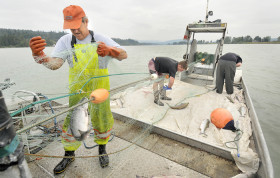 Conservationists are worried a predicted bonanza of sockeye salmon returning to the Fraser River this summer will also bring a frenzy of fishing that could harm weaker stocks. Read more here richmondreview.com 13:03
Conservationists are worried a predicted bonanza of sockeye salmon returning to the Fraser River this summer will also bring a frenzy of fishing that could harm weaker stocks. Read more here richmondreview.com 13:03
Paper log book requirement questioned by PEI fishermen – Prefered an electronic system
 Lobster fishermen on P.E.I. are disappointed monitoring of their catch this year will be on paper, rather than electronic. This year, for the first time, the federal Department of Fisheries and Oceans is requiring fishermen to record their daily catches. DFO says it’s part of the process of moving towards a sustainable fishery certification. Read more here 07:15
Lobster fishermen on P.E.I. are disappointed monitoring of their catch this year will be on paper, rather than electronic. This year, for the first time, the federal Department of Fisheries and Oceans is requiring fishermen to record their daily catches. DFO says it’s part of the process of moving towards a sustainable fishery certification. Read more here 07:15
New England: Handicapping our fishermen
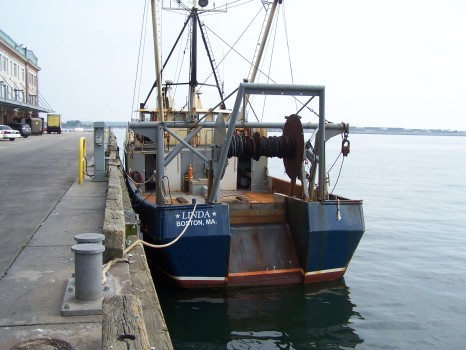 Hadddock populations are known to be cyclical. Having recovered from recent lows in the 1990s, the stock is now healthy and abundant. In fact, for nearly a decade, haddock biomass has been hovering at or above the highest levels recorded in 60 years. But you wouldn’t know that by looking at what American fishermen have been landing. Despite being one of the most plentiful groundfish stocks available, our fishermen have been mostly unsuccessful at harvesting their allocations. Read more here bostonglobe 11:30
Hadddock populations are known to be cyclical. Having recovered from recent lows in the 1990s, the stock is now healthy and abundant. In fact, for nearly a decade, haddock biomass has been hovering at or above the highest levels recorded in 60 years. But you wouldn’t know that by looking at what American fishermen have been landing. Despite being one of the most plentiful groundfish stocks available, our fishermen have been mostly unsuccessful at harvesting their allocations. Read more here bostonglobe 11:30The Fraser River could have the biggest salmon run in B.C. history this summer, with up to 72 million sockeye returning.
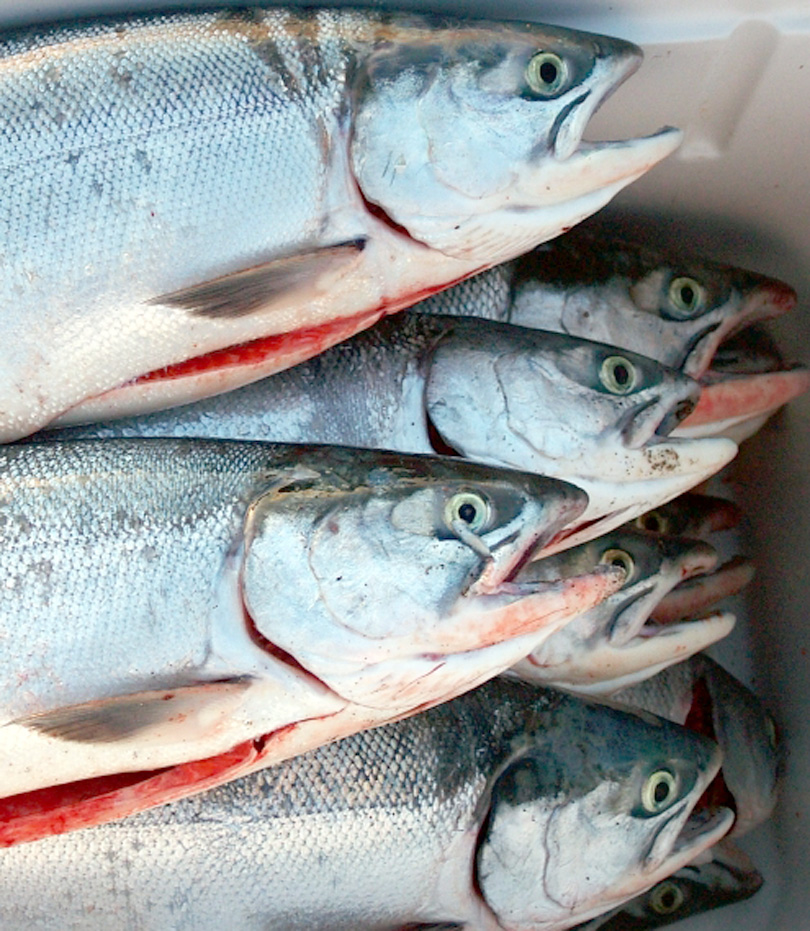 “I mean, it’s hard to fathom,” Rollie Rose, president of Sooke Salmon Charters Ltd., said in an interview of the magnitude of the projections from the Department of Fisheries and Oceans. He told colleagues in a recent e-mail: “The news could not be any better … you will see fishing this year better than you have seen in your lifetime.” Read more here globeandmail 20:33
“I mean, it’s hard to fathom,” Rollie Rose, president of Sooke Salmon Charters Ltd., said in an interview of the magnitude of the projections from the Department of Fisheries and Oceans. He told colleagues in a recent e-mail: “The news could not be any better … you will see fishing this year better than you have seen in your lifetime.” Read more here globeandmail 20:33
Department of Fisheries and Oceans Geoduck draft framework to be unveiled this week
![]() According to a DFO spokesperson, the draft management framework will be posted on the DFO website this week and DFO will accept written comments about it for 45 days after it’s posted. BC Shellfish Growers’ Association executive director Roberta Stevenson says this announcement is big news for B.C.’s aquaculture industry,,, Read more here comoxvalleyrecord 19:32
According to a DFO spokesperson, the draft management framework will be posted on the DFO website this week and DFO will accept written comments about it for 45 days after it’s posted. BC Shellfish Growers’ Association executive director Roberta Stevenson says this announcement is big news for B.C.’s aquaculture industry,,, Read more here comoxvalleyrecord 19:32
Sweetening the (lobster) pot – With fewer harvesters at play, the industry is expected to be more viable
 The Lobster Fishery Sustainability Program, which ends on March 31, will definitely have a positive effect on lobster harvesters’ bottom lines in the future, says the plan’s co-ordinator. Bill Broderick, who’s also the inshore director with the Fish, Food and Allied Workers union (FFAW), said the program achieved its goal to increase incomes by significantly reducing lobster fishing capacity in Fortune Bay, the southwest coast and on the west coast through voluntary trap reductions and lobster licence retirements. Read more here 08:45
The Lobster Fishery Sustainability Program, which ends on March 31, will definitely have a positive effect on lobster harvesters’ bottom lines in the future, says the plan’s co-ordinator. Bill Broderick, who’s also the inshore director with the Fish, Food and Allied Workers union (FFAW), said the program achieved its goal to increase incomes by significantly reducing lobster fishing capacity in Fortune Bay, the southwest coast and on the west coast through voluntary trap reductions and lobster licence retirements. Read more here 08:45
Baker: A DFO library gets checked out
![]()
![]() We all learned this week that more than 50,000 files have been moved or discarded from the library at the Northwest Atlantic Fisheries Centre in Newfoundland and Labrador as part of the federal government plan to consolidate the country’s fisheries libraries. Read more@cbcnews 10:17
We all learned this week that more than 50,000 files have been moved or discarded from the library at the Northwest Atlantic Fisheries Centre in Newfoundland and Labrador as part of the federal government plan to consolidate the country’s fisheries libraries. Read more@cbcnews 10:17
Arctic waters increasingly vulnerable to foreign species
 When most people think of climate change, they picture polar bears, not zooplankton. Zooplankton are a huge group of water organisms which range from microscopic crustaceans to jellyfish and live in both fresh and salt water. Just about everything in the ocean eats zooplankton, from tiny fish to huge whales. In other words, they’re important to the Arctic food chain. But that food chain is about to change dramatically because of climate change and increased shipping traffic, according to some recent studies. more@nunatsiaqonline 18:00
When most people think of climate change, they picture polar bears, not zooplankton. Zooplankton are a huge group of water organisms which range from microscopic crustaceans to jellyfish and live in both fresh and salt water. Just about everything in the ocean eats zooplankton, from tiny fish to huge whales. In other words, they’re important to the Arctic food chain. But that food chain is about to change dramatically because of climate change and increased shipping traffic, according to some recent studies. more@nunatsiaqonline 18:00
Cod not in danger, researcher George Rose says
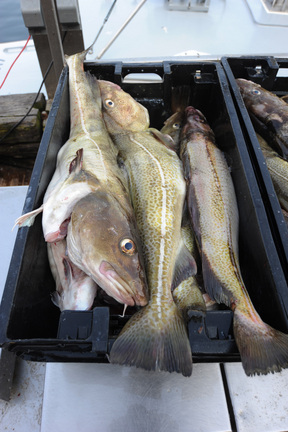 George Rose, a former federal fisheries scientist who has studied cod for decades, said while stocks are not as plentiful as they once were, they are not nearing extinction. “I don’t really believe that there is any danger for any of these species — cod, redfish or plaice — going biologically extinct,” Rose told CBC News in a telephone interview. more@cbcnews 13:26
George Rose, a former federal fisheries scientist who has studied cod for decades, said while stocks are not as plentiful as they once were, they are not nearing extinction. “I don’t really believe that there is any danger for any of these species — cod, redfish or plaice — going biologically extinct,” Rose told CBC News in a telephone interview. more@cbcnews 13:26






 “Every year on Feb. 28, the cod season ends. Right now it’s extended for a month to drag cod, so they (large companies) are out there fishing it during the spawning season and we don’t hear any uproar from the union, from scientists or the provincial government,” Leonard said. Collett added that the way things are going, history is repeating itself as the same mistakes are occurring as in pre-moratorium days.
“Every year on Feb. 28, the cod season ends. Right now it’s extended for a month to drag cod, so they (large companies) are out there fishing it during the spawning season and we don’t hear any uproar from the union, from scientists or the provincial government,” Leonard said. Collett added that the way things are going, history is repeating itself as the same mistakes are occurring as in pre-moratorium days. 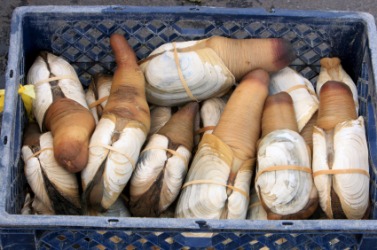 Canada’s Department of Fisheries and Oceans (DFO) has released its
Canada’s Department of Fisheries and Oceans (DFO) has released its 


























